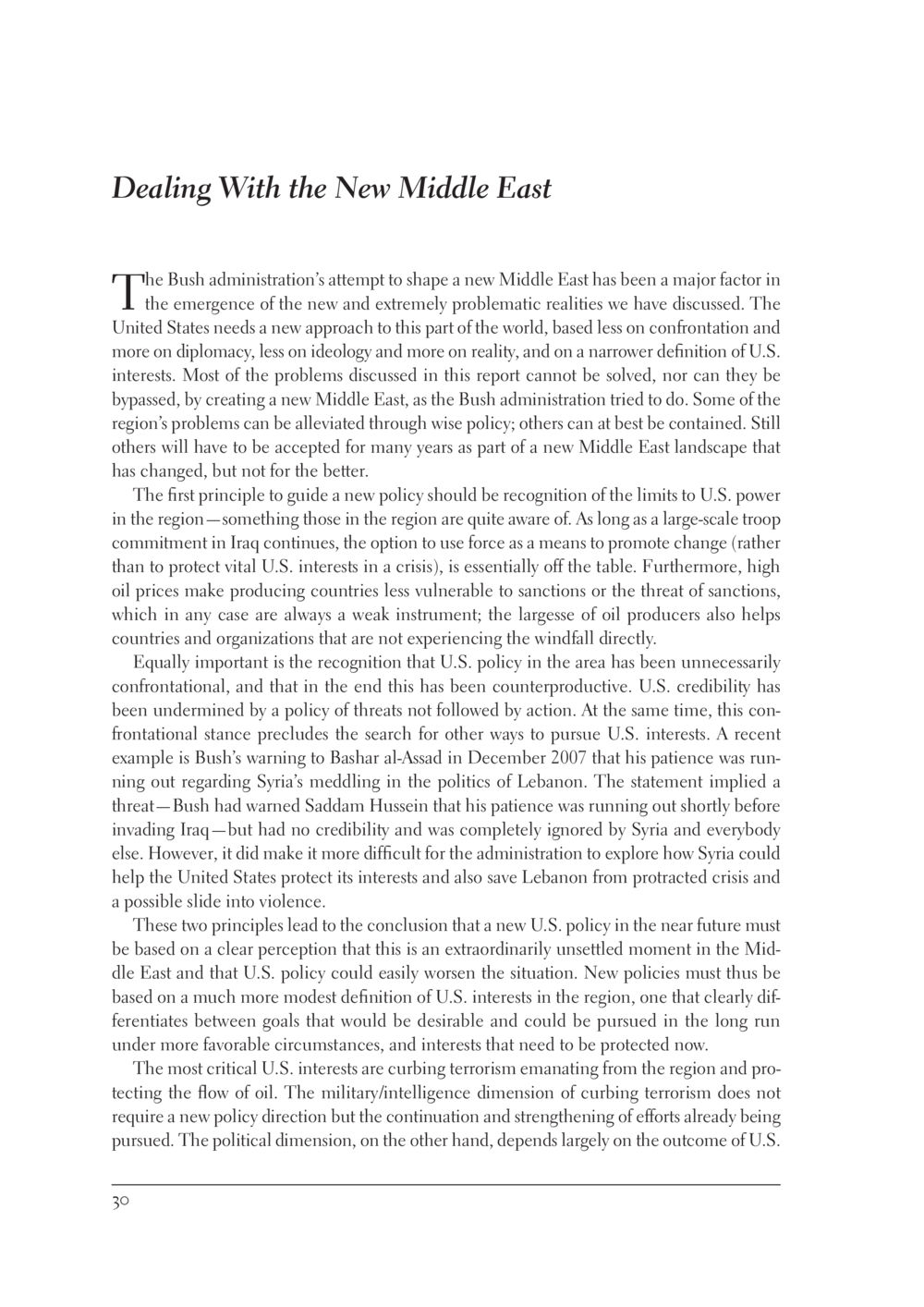Dealing With the New Middle East : หน้า 36/52
The New Middle East : หน้า 36/52 Analyzing the need for a new U.S. approach to the Middle East, emphasizing diplomacy over confrontation and a modest definition of interests.
0 ครั้ง

สรุปเนื้อหา
The Bush administration's policies have complicated the realities in the Middle East. A new approach is needed, prioritizing diplomacy and a clear understanding of U.S. limits in the region. Confrontational tactics have undermined credibility and obstructed potential cooperation. Critical interests include curbing terrorism and protecting oil flow, necessitating a pragmatic strategy. Current U.S. involvement in Iraq complicates potential forceful actions. A modest definition of U.S. interests is essential for future policies to avoid aggravating the situation further.
หัวข้อประเด็น
-U.S. policy in the Middle East
-the role of diplomacy
-confrontational vs. cooperative approaches
-limits of U.S. power
-curbing terrorism and oil protection
ข้อความต้นฉบับในหน้า
Dealing With the New Middle East
The Bush administration's attempt to shape a new Middle East has been a major factor in the emergence of the new and extremely problematic realities we have discussed. The United States needs a new approach to this part of the world, based less on confrontation and more on diplomacy, less on ideology and more on reality, and on a narrower definition of U.S. interests. Most of the problems discussed in this report cannot be solved, nor can they be bypassed, by creating a new Middle East, as the Bush administration tried to do. Some of the region's problems can be alleviated through wise policy; others can at best be contained. Still others will have to be accepted for many years as part of a new Middle East landscape that has changed, but not for the better.
The first principle to guide a new policy should be recognition of the limits to U.S. power in the region—something those in the region are quite aware of. As long as a large-scale troop commitment in Iraq continues, the option to use force as a means to promote change (rather than to protect vital U.S. interests in a crisis), is essentially off the table. Furthermore, high oil prices make producing countries less vulnerable to sanctions or the threat of sanctions, which in any case are always a weak instrument; the largesse of oil producers also helps countries and organizations that are not experiencing the windfall directly.
Equally important is the recognition that U.S. policy in the area has been unnecessarily confrontational, and that in the end this has been counterproductive. U.S. credibility has been undermined by a policy of threats not followed by action. At the same time, this confrontational stance precludes the search for other ways to pursue U.S. interests. A recent example is Bush's warning to Bashar al-Assad in December 2007 that his patience was running out regarding Syria's meddling in the politics of Lebanon. The statement implied a threat—Bush had warned Saddam Hussein that his patience was running out shortly before invading Iraq—but had no credibility and was completely ignored by Syria and everybody else. However, it did make it more difficult for the administration to explore how Syria could help the United States protect its interests and also save Lebanon from protracted crisis and a possible slide into violence.
These two principles lead to the conclusion that a new U.S. policy in the near future must be based on a clear perception that this is an extraordinarily unsettled moment in the Middle East and that U.S. policy could easily worsen the situation. New policies must thus be based on a much more modest definition of U.S. interests in the region, one that clearly differentiates between goals that would be desirable and could be pursued in the long run under more favorable circumstances, and interests that need to be protected now.
The most critical U.S. interests are curbing terrorism emanating from the region and protecting the flow of oil. The military/intelligence dimension of curbing terrorism does not require a new policy direction but the continuation and strengthening of efforts already being pursued. The political dimension, on the other hand, depends largely on the outcome of U.S.
หน้าหนังสือทั้งหมด
หนังสือที่เกี่ยวข้อง
Load More




















































